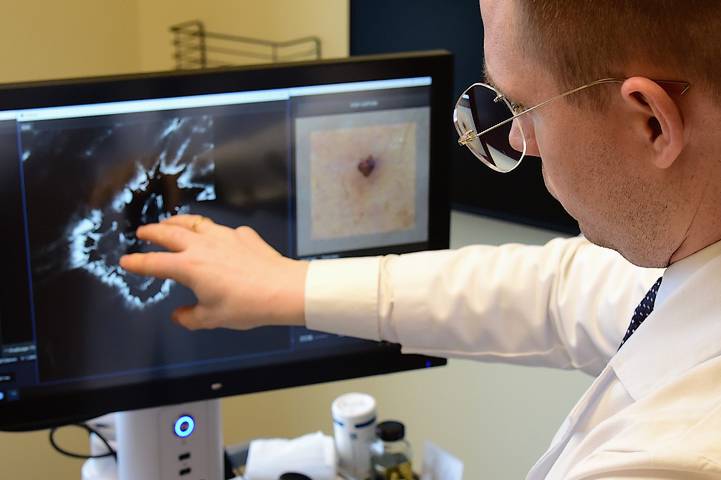
An experienced consultant’s view is important and can be enhanced by an ability to go beyond the naked eye.
Unlike bowel, or breast cancer, there is no national screening programme for skin cancer in the UK. This is partly based on a belief that people will spot their own skin cancer, when they often do not, along with economic arguments.
The most deadly form of skin cancer, melanoma, is not common, so the feeling is that costs would outweigh benefits. This rationale is however questionable, as other economic factors are not considered.
Alongside reducing mortality, the objective of skin cancer screening is early detection. This reduces the amount of extensive care, or complex operations patients require, saving them distress and saving cost.
Skin cancers as a whole are relatively common and discomfort apart, less treatment also means less time when people are unable to work.
Real World Outcome
Apart from factoring in overall costs, rather than one cost, we are able to look at one country where skin cancer screening is widespread. This has been available nationally in Germany since 2008.
As an unusual example, the German case has been well studied, with a mix of results. The measured improvement in mortality is low but the level of early diagnosis is significantly higher and less treatment is required.
The positive outcome of screening for those at higher risk of skin cancer has also been noted, a fair part of the population. An accurate view on mortality changes may need more time but overall, the program has been successful.
Implementation Issues
The German experience, along with wider research, highlights a problem. Skin cancer diagnosis is more accurate when patients visit an experienced dermatologist, rather than having screening at their local doctor.
Germany did factor in additional training but carrying this out to truly effective levels is far from easy. In the UK, where there is a greater shortage of qualified dermatologists, the position would be heightened.
All doctors will do their best and often detect an issue for referral but the chances of missed tumours, or false positives are higher. The first is naturally counterproductive, the second causes unneccessary concern.
A doctor with less experience may also refer cases which are skin cancer but could be treated easily and promptly by a specialist. Not overdiagnosis as such but adding a link in the chain and an additional appointment.
Looking Forwards
The argument on whether skin cancer screening should be an NHS requirement will continue. We don’t doubt the medical benefits of this, the stage of melanoma discovery and that of other skin cancers is vital to health.
Well publicised screening programs also increase awareness of risk factors and the need for sun protection, again reducing disease. With the increase in skin cancer rates over recent decades, a critical step.
We would hope to see a national program, at least for those most at risk but accept this is unlikely in the near future. Wider service backlogs from Covid, related economic factors and lack of well trained staff do not bode well.
Although only where affordable, screening is fortunately available within the UK, at specialist clinics. They offer experienced staff, digital recording to monitor change and state of the art diagnostic systems.
Of the many health spends we can all make, skin cancer screening is high value. You are welcome to contact us, to arrange a suitable appointment.
You may find the options below useful:
- Save time with an intuitive search on: Skin Cancer Diagnosis & Treatment.
- Up to date news, research and insights: Our Dedicated Skin Cancer Blog.
For any advice, or to arrange a dermatology appointment, call 020 8441 1043, or send an email via the Make An Appointment button below.
